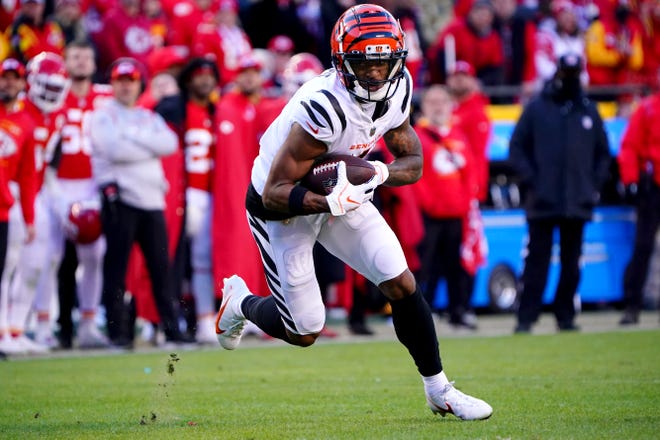
WASHINGTON – A federal appeals court on Friday reinstated a Biden administration rule requiring large companies to mandate COVID-19 vaccines or implement testing, though the ruling is unlikely to be the final word on the matter.
The Cincinnati-based U.S. Court of Appeals for the 6th Circuit lifted another court’s order from November that blocked the mandate from taking effect. Businesses with 100 or more employees would be required under the rule to stand up vaccine or regular testing requirements by Jan. 4 or face penalties of nearly $14,000 per violation.
A 2-1 majority of the court found that OSHA was likely within its legal authority to implement the "emergency temporary standard" requiring vaccines or testing.
"Fundamentally, the ETS is an important step in curtailing the transmission of a deadly virus that has killed over 800,000 people in the United States, brought our healthcare system to its knees, forced businesses to shut down for months on end, and cost hundreds of thousands of workers their jobs," Judge Jane Stranch wrote for the court.
Stranch, nominated by President Barack Obama, and Judge Julia Gibbons, nominated by President George W. Bush, made up the majority. Judge Joan Larsen, nominated by President Donald Trump, dissented from the court's ruling.
"The Secretary of Labor lacks statutory authority to issue the mandate," Larsen wrote.
The move came a day after the Biden administration asked the Supreme Court to reinstate another vaccine mandate that applies to health care workers. Federal courts in Missouri and Louisiana blocked that requirement, which applies to people who work in health facilities that receive federal funding, such as through Medicare.
The on-again-off-again handling of the mandate underscored how much lower federal courts have wrestled with legal questions surrounding COVID-19 vaccine requirements – an issue that will likely ultimately have to be decided by the Supreme Court. So far, the nation's highest court has refused to block several local mandates.

President Joe Biden’s administration unveiled a series of mandates in November, including for large employers, federal contractors and health care workers. All of those rules have been put on hold by courts as lawsuits challenging them are reviewed.
More:Biden administration braces for a wave of legal challenges to COVID-19 rule
More:20 questions, answers on the new COVID-19 vaccine rules for workers
Court battles about the employer mandate have focused on whether the Occupational Safety and Health Administration has the authority under a 1970 law to require companies to ensure workers are vaccinated or tested. Supporters say the mandate would reach millions of Americans in the workplace, expanding the number of people who are vaccinated against the coronavirus. Critics say COVID-19 isn't a workplace safety issue, and that the administration's use of the OHSA law is an overreach.
A panel of three Republican-appointed judges from the U.S. Court of Appeals for the 5th Circuit described the mandate as "staggeringly overbroad" on Nov. 12 and ordered that its implementation remain blocked in a divisive case likely bound for the Supreme Court.
But a flood of lawsuits challenging the federal rule were then consolidated in the 6th Circuit, a court that was drawn at random by federal judiciary officials. That court has the authority to lift the 5th Circuit’s order and it chose to do so on Friday.
The latest ruling doesn’t mean the vaccine-or-testing mandate goes into effect immediately: The Biden administration had given businesses until January to implement the order even before the lawsuits were filed. And there’s a good chance the 6th Circuit’s latest ruling will be appealed by a number of Republican state officials.
The dispute will likely work its way up to the Supreme Court. The justices have repeatedly turned away emergency appeals seeking to block the enforcement of vaccine mandates in other contexts. In August, it declined to halt Indiana University's vaccine requirement. In early October, it declined to halt a New York City requirement that public school teachers receive COVID-19 vaccinations.
More recently, the court declined in October to block a vaccine mandate for health care workers in Maine over objections that it didn't include a religious exemption. And on Monday, the Supreme Court permitted a COVID-19 vaccine mandate for New York health care workers that doesn't include a religious exemption.
Those cases all involved emergency efforts to temporarily put mandates on hold, not more fundamental questions about their constitutionality or other challenges to their legality. They also involved state and local governments, which have broader public safety powers than the federal government.
One of the plaintiffs in the employer mandate case said late Friday it would appeal the ruling.
"This mandate adds an incredible burden on small business owners who are still suffering negative effects of the pandemic," Job Creators Network president and CEO Alfredo Ortiz said in a statement. "This mandate will make it even harder for small business owners to find and keep employees."
Brianne Gorod, chief counsel for the Constitutional Accountability Center, said the 6th Circuit was "plainly right" to allow the policy to take effect.
"If, as is expected, the policy's challengers next go to the Supreme Court, the Supreme Court should allow the policy – and the critically important protections that it provides to American workers – to remain in place," Gorod said. "In a week when we learned the tragic fact that the pandemic has claimed 800,000 members of the American family, the stakes could not be clearer."
Source link








